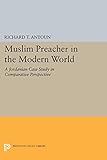Muslim Preacher in the Modern World : A Jordanian Case Study in Comparative Perspective / Richard T. Antoun.
Material type: TextSeries: Princeton Legacy Library ; 974Publisher: Princeton, NJ : Princeton University Press, [2014]Copyright date: ©1989Edition: Course BookDescription: 1 online resource (306 p.)Content type:
TextSeries: Princeton Legacy Library ; 974Publisher: Princeton, NJ : Princeton University Press, [2014]Copyright date: ©1989Edition: Course BookDescription: 1 online resource (306 p.)Content type: - 9780691602752
- 9781400860074
- 297.65
- BP184.25 -- A5 1989eb
- online - DeGruyter
- Issued also in print.
| Item type | Current library | Call number | URL | Status | Notes | Barcode | |
|---|---|---|---|---|---|---|---|
 eBook
eBook
|
Biblioteca "Angelicum" Pont. Univ. S.Tommaso d'Aquino Nuvola online | online - DeGruyter (Browse shelf(Opens below)) | Online access | Not for loan (Accesso limitato) | Accesso per gli utenti autorizzati / Access for authorized users | (dgr)9781400860074 |
Browsing Biblioteca "Angelicum" Pont. Univ. S.Tommaso d'Aquino shelves, Shelving location: Nuvola online Close shelf browser (Hides shelf browser)

|

|

|

|

|

|

|
||
| online - DeGruyter K'ung-ts'ung-tzu : The K'ung Family Masters' Anthology / | online - DeGruyter The Artistry of Aeschylus and Zeami : A Comparative Study of Greek Tragedy and No / | online - DeGruyter Poems to Siva : The Hymns of the Tamil Saints / | online - DeGruyter Muslim Preacher in the Modern World : A Jordanian Case Study in Comparative Perspective / | online - DeGruyter Meaning and Power in a Southeast Asian Realm / | online - DeGruyter Papers of Thomas Jefferson - Second Series. 5, Jefferson's Literary Commonplace Book / | online - DeGruyter The Transformation of Theology, 1830-1890 : Positivism and Protestant Thought in Britain and America / |
Frontmatter -- Contents -- Illustrations -- Tables and Figures -- Key to Transliteration of Arabic Letters and Symbols -- Preface -- Introduction -- 1. The Social Organization of Tradition -- 2. Islam in Its Local Environment: The Village, Its Constituent Units, and the Peasant Predicament -- 3. The Role of the Preacher, the Content of the Sermon: The Case of Luqman -- 4. The Rhetoric of Religion: An Analysis of Rahm (Womb, Kinship, Compassion) -- 5. The Islamic Sermon (Khutba), The Islamic Preacher (Khatib), and Modernity -- 6. Islamic Ritual and Modernity: The Pilgrimage (Hajj) Interpreted -- 7. Religion and Politics: "Parties" (Ahzab), Processes, and the Complicated Relationship between "People's Religion" and "Government Religion" -- 8. The Interpretation of Islam by Muslim Preachers in the Modern World: Five Views of the Prophet's Night Journey and Ascent -- 9. Islamization, Islamic Fundamentalism, Islamic Resurgence, and the Reinterpretation of Tradition in the Modern World -- Bibliography -- Index
restricted access online access with authorization star
http://purl.org/coar/access_right/c_16ec
Richard Antoun documents and exemplifies the single most important institution for the propagation of Islam, the Friday congregational sermon delivered in the mosque by the Muslim preacher. In his analysis of various sermons collected in a Jordanian village and in Amman, the author vividly demonstrates the scope of the Islamic corpus (beliefs, ritual norms, and ethics), its flexibility with respect to current social issues and specific social structures, and its capacity for interpretation and manipulation.Focusing on the pivotal role of preacher as "culture broker," Antoun compares the process of "the social organization of tradition" in rural Jordan with similar processes outside the Muslim world. He then highlights the experiential dimension of Islam. The sermons discussed range over such topics as family ethics, political attitudes, pilgrimage, education, magic, work, compassion, and individual salvation.Originally published in 1989.The Princeton Legacy Library uses the latest print-on-demand technology to again make available previously out-of-print books from the distinguished backlist of Princeton University Press. These editions preserve the original texts of these important books while presenting them in durable paperback and hardcover editions. The goal of the Princeton Legacy Library is to vastly increase access to the rich scholarly heritage found in the thousands of books published by Princeton University Press since its founding in 1905.
Issued also in print.
Mode of access: Internet via World Wide Web.
In English.
Description based on online resource; title from PDF title page (publisher's Web site, viewed 30. Aug 2021)


